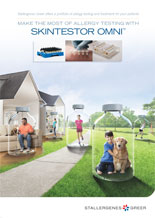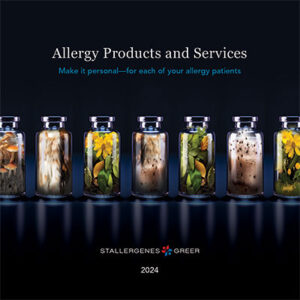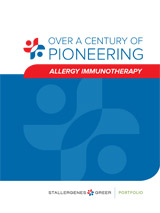Continue Learning About Allergy Immunotherapy

Allergy Immunotherapy Primer
An introduction to allergy immunotherapy (AIT). This brochure covers efficacy, safety, and tips for discussing subcutaneous and sublingual AIT with patients.

Patient Allergy Immunotherapy Primer
Give patients the opportunity to learn more about allergy immunotherapy, and what to expect when being treated with immunotherapy.

Skintestor OMNITM Brochure
A deep dive on the benefits and features of our multiple-site testing device.

Stallergenes Greer Allergy Products and Services Catalog
Covers the specifics of all the allergy products and services offered by Stallergenes Greer.

Stallergenes Greer Portfolio Brochure
Learn about the Stallergenes Greer products and services that can help you administer AIT in your office.
Stallergenes Greer also offers a sublingual grass allergy immunotherapy tablet treatment option. Learn more.
Sign up to participate in live or online Skin Testing Review Sessions.
IMPORTANT SAFETY INFORMATION
WARNING: SEVERE ALLERGIC REACTIONS
- Allergenic extracts can cause severe life-threatening systemic reactions, including anaphylaxis.
- Do not administer allergenic extracts to patients with severe, unstable, or uncontrollable asthma.
- Observe patients in the office for at least 30 minutes following treatment. Emergency measures and personnel trained in their use must be available immediately in the event of a life-threatening reaction.
- Immunotherapy may not be suitable for patients with certain underlying medical conditions that may reduce their ability to survive a systemic allergic reaction.
- Allergenic extracts may not be suitable for patients receiving medications such as beta-blockers that may make them unresponsive to epinephrine or inhaled bronchodilators.
Do not inject intravenously. Initial dose should be based on skin test reactivity.
The most common adverse reactions include localized erythema, itching, swelling, tenderness, and pain. Systemic adverse reactions include generalized skin erythema, urticaria, pruritus, angioedema, rhinitis, wheezing, chest tightness, laryngeal edema, and hypotension.
INDICATIONS
Non-Standardized Allergenic Extracts: Allergenic extracts are indicated for skin test diagnosis of patients with a clinical history of allergies to one or more of the specific allergens and treatment for reduction of allergen-induced allergic symptoms confirmed by positive skin tests or in vitro testing for allergen-specific IgE antibodies. Food extracts have not been proven safe or effective in allergen immunotherapy.
Short Ragweed Pollen Allergenic Extract and Short and Giant Ragweed Pollen Mix Allergenic Extract: Short Ragweed Pollen Allergenic Extract and Short and Giant Ragweed Pollen Mix Allergenic Extract are indicated for skin test diagnosis of patients with a clinical history of allergy to ragweed pollen (Short Ragweed or Short and Giant Ragweed pollen), and immunotherapy for the reduction of ragweed pollen-induced allergic symptoms confirmed by positive skin test or by in vitro testing for pollen-specific IgE antibodies for Short and/or Giant Ragweed pollen.
Standardized Cat Hair Allergenic Extract: Standardized Cat Hair Allergenic Extract is indicated for skin test diagnosis of patients with a history of allergy to cats and treatment of cat hair-induced allergic asthma, rhinitis and conjunctivitis when avoidance is not possible.
Standardized Grass Pollen Allergenic Extracts: Standardized Grass Pollen Allergenic Extracts are indicated for skin test diagnosis of patients with a clinical history of allergy to one or more of the following grass pollens: Bermuda, Kentucky Blue (June), Meadow Fescue, Orchard, Perennial Rye, Redtop, Sweet Vernal, Timothy; and immunotherapy for the reduction of grass pollen-induced allergic symptoms confirmed by positive skin test or by in vitro testing for pollen-specific IgE antibodies for Bermuda, Kentucky Blue (June), Meadow Fescue, Orchard, Perennial Rye, Redtop, Sweet Vernal, or Timothy grass pollens.
Standardized Mite Extracts: Standardized Mite Allergenic Extracts are indicated for diagnosis of skin test reactivity to dust mite allergen and treatment of mite-induced allergic asthma, rhinitis and conjunctivitis in patients that show hypersensitivity to dust mites based on clinical history, allergen exposure history, and skin test reactivity.
Please click here for Package Inserts with full Prescribing Information, including Boxed Warnings.
To report suspected adverse reactions, contact Stallergenes Greer at 1-855-274-1322 or FDA at 1-800-FDA-1088 or www.fda.gov/Safety/MedWatch.
